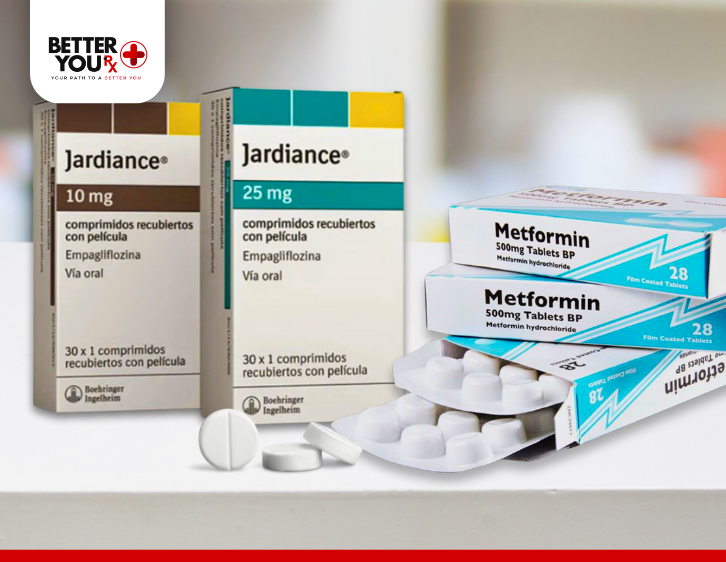Jardiance vs. Metformin: Comparison for Managing Type 2 Diabetes
Effectively managing type 2 diabetes is vital for preserving overall health and avoiding complications. Two widely prescribed medications for this condition are Jardiance (empagliflozin) and Metformin. Grasping the distinctions between these medications can empower patients to make informed choices regarding their treatment options. This article delves into the mechanisms, benefits, side effects, and considerations of Jardiance and Metformin, helping you navigate your diabetes management journey.
Understanding Type 2 Diabetes

Type 2 diabetes is a long-term condition marked by insulin resistance and high blood glucose levels. The disease often leads to a host of complications, including cardiovascular disease, neuropathy, and kidney damage. With the rising prevalence of type 2 diabetes, effective management has become paramount. The treatment landscape for this condition has evolved significantly, with medications like Jardiance and Metformin playing crucial roles in patient care.
What is Metformin?
Metformin is a biguanide medication that has long been considered the first-line treatment for type 2 diabetes. Its primary mode of action involves decreasing hepatic glucose production, which means it reduces the amount of sugar produced by the liver. Additionally, Metformin enhances insulin sensitivity, facilitating better glucose uptake by peripheral tissues such as muscles. This dual action not only helps to lower blood glucose levels but also contributes to overall metabolic health.
One of the key benefits of Metformin is its weight-neutral effect. Unlike some diabetes medications that may lead to weight gain, Metformin is generally well-tolerated by patients who are overweight or obese, making it a suitable choice for many. Moreover, extensive research indicates that Metformin may have cardiovascular benefits, reducing the risk of heart-related complications in patients with type 2 diabetes. Its low risk of causing hypoglycemia—dangerously low blood sugar levels—further solidifies Metformin’s status as a cornerstone in diabetes management.
What is Jardiance?
Jardiance, classified as a sodium-glucose co-transporter-2 (SGLT2) inhibitor, offers a different mechanism for controlling blood sugar levels. By inhibiting the SGLT2 protein in the kidneys, Jardiance prevents the reabsorption of glucose back into the bloodstream, thereby increasing glucose excretion through urine. This process not only helps lower blood glucose levels but also encourages weight loss, making Jardiance an attractive option for patients struggling with obesity alongside diabetes.
The benefits of Jardiance extend beyond just glucose control. Clinical studies have shown that Jardiance significantly reduces the risk of cardiovascular events, offering protection to patients with existing heart conditions. Additionally, evidence suggests that it may slow the progression of kidney disease, which is particularly important given the high incidence of renal complications in individuals with diabetes.
Side Effects of Metformin
While Metformin is generally well-tolerated, it is not without its side effects. Commonly reported gastrointestinal issues include nausea, diarrhea, and abdominal discomfort, especially during the initial phases of treatment. A rare but serious condition called lactic acidosis can occur in patients with compromised kidney function, emphasizing the importance of regular monitoring. Long-term use of Metformin has also been associated with vitamin B12 deficiency, which may require supplementation in some cases.
Side Effects of Jardiance
Jardiance, although effective, also presents a range of potential side effects. Some patients report urinary tract infections and genital mycotic infections (yeast infections), which are linked to the increased glucose concentration in urine that can promote fungal growth. Dehydration is another concern, as Jardiance can lead to reduced fluid levels in the body, resulting in low blood pressure (hypotension). In rare instances, patients may experience ketoacidosis, a serious condition that occurs when the body produces high levels of ketones, leading to dangerously acidic blood.
When to Choose Metformin vs. Jardiance

Deciding between Metformin and Jardiance often depends on individual patient factors, including weight considerations, cardiovascular health, and kidney function. For patients who are overweight and seeking to lose weight, Jardiance may be the more suitable option due to its associated weight loss benefits. Conversely, if a patient has existing cardiovascular issues, healthcare providers may prefer Jardiance for its proven protective effects. Both medications can affect kidney function, necessitating thorough assessment before prescribing.
Combining Medications
In some cases, healthcare providers may recommend a combination of both medications to achieve optimal blood glucose control. The synergistic effect of Metformin and Jardiance can address different pathways involved in glucose regulation, potentially leading to improved outcomes for patients who are struggling to manage their diabetes with a single medication.
Which is Better: Jardiance or Metformin?

When determining which medication is superior, it ultimately hinges on the individual’s health profile, preferences, and treatment goals. Metformin is the preferred first-line therapy for most individuals with type 2 diabetes, particularly for those who are newly diagnosed. Its established track record, low cost, and minimal side effects make it a reliable choice.
Conversely, Jardiance may be more suitable for patients with specific conditions, such as cardiovascular disease or obesity. Its unique benefits extend beyond glycemic control, offering protection against heart failure and kidney disease . For some individuals, a combination of both medications may be necessary to achieve optimal blood sugar control and address other health concerns.
Conclusion
In summary, both Jardiance and Metformin have their unique strengths and considerations. While Metformin remains the cornerstone of type 2 diabetes management, Jardiance offers additional benefits, particularly for those with cardiovascular risks or weight management challenges. The choice between the two should be guided by a healthcare provider, considering each patient’s specific health circumstances and treatment goals.
For a more personalized approach and to explore options tailored to your health needs, consult with your healthcare provider or visit Better You Rx for further resources and information.










